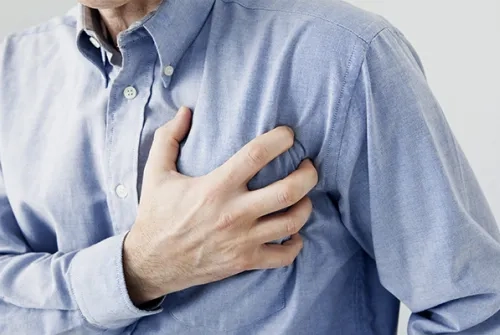Alo Yeditepe
Alo Yeditepe
Heart Attack Causes and Symptoms
Heart attack is sometimes manifested not by typical chest pain, but by shortness of breath, nausea, and sweating. Prof. Dr. Muzaffer Değerertekin, Head of the Cardiology Department of Yeditepe University Hospitals, stated that this picture, which is called a silent heart attack, delays treatment and threatens life more and explained the causes of heart attack and the symptoms of a heart attack.
Could You Describe Chest Pain During a Heart Attack?
Chest pain due to cardiovascular diseases can be defined as pain felt behind the bone in the middle part of the chest, known as the breastbone, exacerbated by effort or emotional stress. After this pain occurs, it decreases when the patient starts to rest or when he/she takes the sublingual medicine prescribed to him/her if he/she has cardiovascular disease. The character of the pain that occurs can be described as compressive, burning, or a feeling as if someone is sitting in the rib cage. Chest pain during a heart attack is similar to the pain characteristics we have just described, but it is usually more severe, does not go away at rest, and is long-lasting. Symptoms such as nausea, vomiting, cold sweating, and fear of death are often accompanied.
Is Every Patient's Case Exactly Like That?
Unfortunately, no... Some patients express chest pain not as "pain" but as shortness of breath, a feeling of compression in the chest. This makes the diagnosis difficult. Heart attack sometimes manifests itself not with typical chest pain, but with shortness of breath, nausea, and sweating. This case, called a silent heart attack, delays treatment and is more life-threatening. Symptoms often occur in women, the elderly, and people with diabetes.
Is the Pain at a Point that can be Shown with a Finger or is it in a Wider Area?
The patient typically expresses pain by showing a fist-wide area. Although it is most often felt in the middle region of the rib cage, the pain can spread to both shoulders, arms (usually the left arm, sometimes both arms), back, and upper part of the stomach. In summary, the pain can spread to any area between the lower jaw and the belly button. The appearance of pain in a single point suggests muscle-bone pain and pain seen in lung diseases rather than pain seen in cardiovascular diseases.
Does Pain Change with Breathing or Movement Suggest a Heart Attack?
Especially stinging pains caused by deep breathing, coughing, or changing body position are mostly seen in diseases other than cardiovascular diseases. Examples of these diseases include muscle and bone pain, inflammation of the cardiac membrane, and obstruction of the lung vessels with clots.
Does the Duration of Heart Pain Important?
The pain associated with the narrowing of the heart vessels usually lasts between 2-10 minutes, rarely lasting 10-15 minutes. It usually causes the patient to stop his/her activity at that time, and after a little rest, it decreases and disappears. In the presence of pain that persists longer than this period or does not go away despite taking sublingual medication, it is necessary to suspect a heart attack. Conversely, pains lasting less than 30 seconds, of an instantaneous and especially subtle nature, do not occur due to the narrowing of the heart vessels.
Do Diabetics and Women Tend to Have Silent Heart Attacks?
Women present with more atypical complaints in terms of pain characteristics than men. Examples of these include shortness of breath, nausea, and sweating. In diabetic patients, as a result of the damage caused by high blood sugar at the nerve endings of the heart, the person may not feel the pain. When the characteristics of the patients who had heart attacks were examined, it was seen that approximately one-third of them did not present with typical chest pain. Delays in diagnosis and treatment of patients due to atypical complaints in the elderly, women, diabetic patients, and people with heart failure increase mortality rates in these patient groups.
What are the Causes of Heart Attack?
The vast majority of heart attacks occur due to the rupture of fatty plaques in the coronary arteries feeding the heart and the occlusion of the vein completely or almost completely as a result of a blood clot on the ruptured plaque. Moreover, heart attacks may develop as a result of high or low blood pressure, decreased blood oxygen, severe anemia, and rupture of the aorta. More rarely, a heart attack can also be seen as bypass surgery or a complication of stent-balloon procedures.
What Should Someone Suspect Having a Heart Attack Do?
If you suspect that you or someone close to you is having a heart attack, you should call 112 immediately to seek medical attention. The person who has a heart attack must never go to the hospital alone, must never drive a car, and must stay away from efforts that will tire the heart. Chewing 300 mg of aspirin during the time it takes to receive professional health care will provide the first medical intervention.
Should Someone With Cardiovascular Disease Have a Possible Heart Attack Action Plan?
People with cardiovascular disease have a higher risk of having recurrent heart attacks than normal people. Hence, these people must comply with the medications prescribed by their physicians and also comply with the lifestyle changes recommended by their physicians (salt-free and fat-free diet, exercise, etc.). In case of chest pain or exacerbation of existing chest pain, it is recommended that they go to a health institution as soon as possible, especially if they have chest pains lasting more than 20 minutes at rest, they should apply to the emergency department through 112.
Is the Frequency of Heart Attacks Related to the Seasons?
Heart attacks are more common in the winter months. Windy and cold weather can cause the narrowing of the heart vessels, lowering the pain threshold. The person may feel symptoms even when they exert much less than the level of effort they normally feel chest pain.
This content was prepared by Yeditepe University Hospitals Medical Editorial Board.
”
See Also
- What is Heart Rhythm Disorder (Arrhythmia)? Symptoms and Causes
- What is Sudden Cardiac Death? What are the Symptoms?
- Risk Factors in Heart Diseases
- Heart Valve Diseases and Treatment Methods
- How Do Heart Disease Risk Factors Affect Women and Men?
- What is a Heart Attack? What are the Symptoms of a Heart Attack?
- What is Broken Heart Syndrome? Symptoms and Treatment
- Carotid Artery Disease
- What is Renal Denervation?
- What is Intravenous Ultrasound (IVUS)?
- Renal Denervation in Hypertension Treatment
- What is TAVI?
- After a heart attack, the risk of mortality is higher in women than in men
- Is Hypertension Seen in Young People?
- Ways to Maintain Heart Health in Cold Weather
- Is Your Heart Ready For Winter?
- The Risk of High Blood Pressure Increases as You Go to High Altitudes
- By 2025, Hypertension Patients Are Expected to Reach 1.5 Billion
- Misconceptions about the Female Heart
- Experts Warn: In Case of Fainting, Consult a Cardiologist First
- Causes of Arhythmia Can be Displayed in 3D
- Being Young Does Not Protect From Heart Disease!
- Your Real Age Is Your Vascular Age
- Blood Pressure Holter
- Coronary CT Angiography (Virtual Angiography)
- Effort Test
- Can Permanent Treatment Be Provided for Rhythm Disorders?
- Goal in Heart Diseases; To reduce the loss of life by at least 25 percent by 2025
- Technique Developed by a Turkish Doctor Has Become Part of Literature; Is Now an Alternative to Pacemakers
- Professors from America Came to Watch the Technique Developed by the Turkish Physician on Site!
Alo Yeditepe




